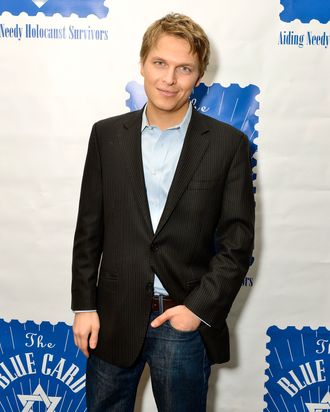
Tonight at the 79th anniversary benefit and auction for The Blue Card, a Holocaust survivor non-profit, Ronan Farrow showed up to the American Museum of Natural History to find a hungry scrum of reporters wondering about his paternity – the rumor reignited when his mother recently told Vanity Fair that he was “possibly” the son of Frank Sinatra, rather than of Woody Allen as it has long been thought.
“You know, I wasn’t there, so I don’t have a lot more to offer than you,” he said, with a winning grin and a flash of those steely blue eyes, after gently declining a joint photo-op with his mother. “Of course, it is a distraction … But I take it in stride. Look, we all have, you know, our family histories to bear … so …” He was then whisked away from the onslaught of questions by a publicist.
Despite the recent news that Ronan Farrow inked a book deal with Penguin to write about his time working in global affairs and secured a job as an MSNBC anchor, the whispers at the party still focused on his lineage: Was he the son of baritone crooner or the auteur of agita?
After he beat an escape, I followed a long hallway to an elaborate banquet room (white swooping drapes, pink glow-lighting, a dozen waiters lined up on a wall with wine at the ready), where Ronan was negotiating a leafy salad so he could mingle and accept the Richard C. Holbrooke Award for Social Justice with his mother during the actual dinner. Miles Davis’s “Kind of Blue” was playing in the background.
Following some small talk, I had to ask him point blank: Why not just do a DNA test and put an end to the paternity speculation?
“You know, that story has been out there for years,” he said. “It was somewhat surprising to see it break in such a huge way of late. I’m fairly … I mean, I appreciate how hilarious it is. I mean, it’s a ridiculous situation. That said, I’m pretty unfazed by it in substance, because it’s been out there both publicly and privately for so long. You know, I have a relationship that I’m very happy with, you know, with all parties involved. For me, the imperative is ‘all right, we’ve talked about it, I get a kick out of it, everyone gets a kick out of it. Let’s move onto the substance,’ — which is one reason I’m so excited to be rolling out this show.”
That’s what he wants to focus on — how MSNBC has plucked him to shake things up on the network.
“And it’s very much about bringing in something that doesn’t resemble any of the existing models,” he said. “Because … to be completely frank …” — as he paused we mentally filled in “Sinatra” — “I think the existing models, you know, could use a breath of fresh air.” He wants to create an informed viewership in his generation that knows how to respond to the issues at hand.
“I think that it is easy to malign us as a distracted generation,” he said. “But we’re also a more engaged generation. And we can talk about ‘slacktivism.’ We can talk about people jumping on trends. But it all emanates from a place of wanting to be more actively involved — wanting to not just sit by and listen to the story but actually wanting a guide, a tool set for how to be engaged. This show is geared around tackling exactly that challenge.”
Editors note: This post has been shortened since its original publication.

